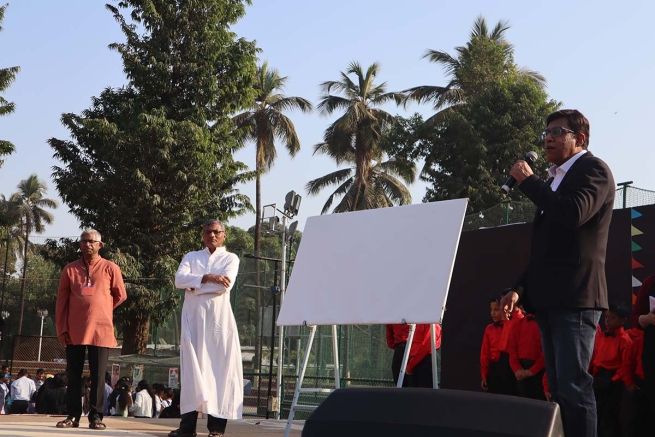INTERNATIONAL YOUTH DAY: Salesian Missions Highlights Programs Around the Globe that Empower Youth Migrants, Shape Brighter Futures
(MissionNewswire) Marking International Youth Day, Salesian Missions joins the United Nations and other organizations around the globe in highlighting the plight and the contributions of young migrants, who often face difficult living conditions away from their homes.
Celebrated each year on August 12, the day was established by the United Nations to raise awareness of issues affecting young people around the world. This year’s theme –“Youth Migration: Moving Development Forward” – is in response to the challenges and opportunities raised by the estimated 27 million youth migrants around the world. According to the United Nations, young people aged 15 to 24 make up more than 10 percent of the 240 million international migrants.
Many of these young migrants are forced to flee from poverty or war. Nearly all of them are searching for better opportunities and safer environments.
Upon arrival in new surroundings, migrants often lack the education and skills needed to survive, and many are homeless. Sometimes young people are left behind by migrating parents and face psychological and social challenges as well as greater vulnerability.
Salesians working around the globe focus on meeting the specific needs of youth facing these challenges. From homeless shelters and youth centers for street children to education and vocational training designed specifically for refugees – the Salesians provide not only a safety net but successful solutions to end the cycle of poverty.
Widely regarded as the largest private provider of vocational and technical training—and working in more than 130 countries around the globe—the Salesians are positioned to make a big impact in the area of youth migration. Already embedded in their local communities, Salesians are able to help refugees who are often seen as “outsiders.”
RURAL COMMUNITIES, AGRICULTURE & YOUTH MIGRATION
To fight the patterns of migration that decimate rural villages in some of the poorest places on the planet, Salesian Missions works to develop programs focused on sustainable agriculture while also improving local economic opportunities. By improving conditions in villages, the local youth there are less likely to migrate to urban areas where they too often join other youth in homelessness and a cycle of poverty and violence.
In Kenya, agricultural training has made a significant difference at the Kakuma Refugee Camp. There, a demonstration farm enables training in agriculture skills while producing fresh fruit and vegetables to feed the refugees and inhabitants of the camp. Agricultural skills are also an important component at the Bosco Boys Kuwinda facility. There, students receive training in the raising and care of livestock including poultry, cows and pigs, as well as in the growing and tending of vegetable gardens. Eggs and meat are sold from the farm to help support the project and all of the milk produced is consumed by the community.
In Ecuador, through a Salesian Missions’ microfinance credit program, indigenous and rural populations have access to funds for agricultural and microbusiness activities. Currently, 12,000 people are taking advantage of this opportunity in 85 different communities.
In Cambodia, the Salesian-run Pascual Gentilini Agricultural School recently celebrated its 85th year teaching agricultural skills to poor youth. The school’s curriculum includes lessons in community service, vegetable gardening, cooking, maintenance, music, annual crops, cultivation of tea, fruit farming, zootechnics, bee-keeping, cattle-raising, leadership training and social work. Agricultural technical training encompasses one to six years of study. The school’s students are enthusiastic and eager to learn modern methods of farming together with business management.
WAR, VIOLENCE & YOUTH MIGRATION
Salesian Missions has developed programs to empower youth migrants with funding support from the U.S. Department of State’s Bureau of Population, Refugees, and Migration.
Since 1983, ethnic violence in Sri Lanka has forced tens of thousands of Sri Lankan Tamils from their homeland in search of safety and a new life in Tamil Nadu, India. Since 2010, Salesian Missions has provided a vocational and entrepreneurial program for young male and female Sri Lankan refugees who have been living in refugee camps in 15 target districts in India. In June 2013, 860 refugees graduated from this program. Half of these students attended a Salesian technical and vocational training center, learning job skills in electrical work, woodworking, computer technology and other similar trades.
In recent years, more than 450,000 people have fled from violence in Colombia to neighboring Ecuador, Venezuela, Panama and Costa Rica. Salesian Missions’ “New Beginnings” initiative, which started in 2011, has worked with more than 1,000 Colombian refugees in these four countries to provide vocational and human development training as well as job placement services. Many of the Colombian refugees had few marketable skills but the “New Beginnings” program allowed them the opportunity to start over and build a stable, hopeful future for themselves and their families. Through the program, each refugee student received 260 hours of technical training as well as job placement services.
“The United States takes great pride in our commitment to the rights of migrants to realize educational and professional opportunities in their new homes,” the State Department said in an official statement.
RESHAPING THE FUTURE
“It is important to emphasize the positive contribution young migrants make to societies of origin, transit and destination – economically and by enriching the social and cultural fabric. Most work hard to earn a living and improve their circumstances,” Secretary-General Ban Ki-moon said in his message for the Day.
Young people have the potential to change negative societal patterns of behavior and break cycles of violence and discrimination that pass from one generation to the next. Salesian Missions remains committed to providing education, opportunities and hope to the world’s most vulnerable youth to help end the cycle of poverty which builds better lives and stronger communities.
###
Sources:
UNICEF
http://www.unicef.org/programme/youth_day/partner.htm
United Nations
http://www.unworldyouthreport.org/index.php?option=com_content&view=article&id=84&Itemid=180
U.S. Department of State
http://www.state.gov/secretary/remarks/2013/08/213041.htm




